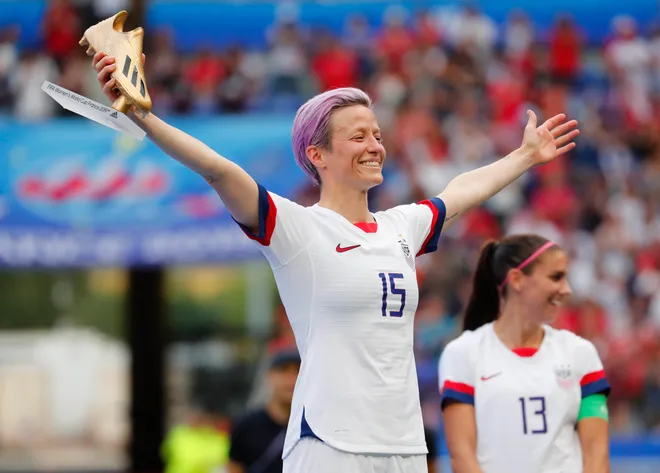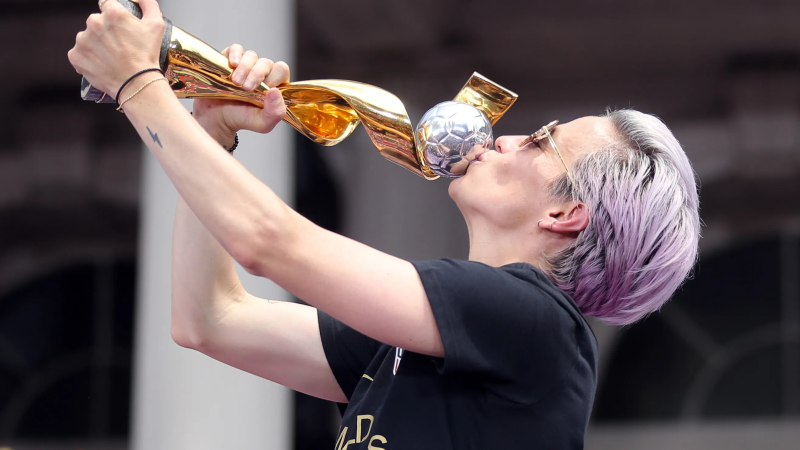Retiring Megan Rapinoe didn't just change the game with the USWNT. She changed the world.
CHICAGO — Megan Rapinoe doesn’t remember exactly when it was or the specific words her mother used. She distinctly remembers what her mom told her and her twin sister, however.
Being good at sports or being popular does not give you a free pass, Rapinoe’s mom said, it gives you a responsibility. If you are fortunate enough to have some kind of advantage — a unique skill or material wealth or whatever — you need to use it for good.
“It’s just kind of my worldview,” Rapinoe said Saturday, “that you have a responsibility to use whatever talent you have or whatever way you can to make the world a better place in some kind of way.”
There’s no question Rapinoe has done that, in so many different ways. As she prepares to step away from the game — Sunday’s match against South Africa is her last with the U.S. women and she is retiring from the OL Reign at the end of the season — Rapinoe’s impact stretches far and wide.
She was integral in the USWNT’s fight for equal pay and working conditions and, as was evident at the World Cup and after, that demand for respect has carried over to players across the globe. She was one of the first high-profile athletes to come out as gay, and her unapologetic willingness to be her true self gave others in the LGBTQ community permission to do the same.
Rapinoe has been a staunch advocate for racial equality, the first white athlete to join Colin Kaepernick in his protests against racist policing. She has stood up for transgender athletes, who’ve been targeted for no other reason than fear, ignorance and the cold-hearted calculations of some shameful politicians.
She’s refused to accept injustice, even when it meant she suffered the repercussions. She’s been the face and the voice of the USWNT, providing cover for teammates who didn’t want to, or couldn’t be.
Like Billie Jean King and Muhammad Ali before her, the many successes Rapinoe had on the field pale in comparison to all the good she's done off it. She didn’t just change the game, she changed the world.
“She’s really shouldered and carried a lot of the burden of criticism that we’ve gotten from people who disagree and who don’t think we deserve the things we believe we deserve,” said Midge Purce, who worked closely with Rapinoe in the equal pay fight.
“To do that — she’s so strong. And I think we owe her a lot more than we can ever convey.”

Rapinoe is the first to acknowledge she’s made mistakes. That she hasn’t always gotten it right. But her heart has always been in the right place and her intentions are sincere.
Those who refuse to give Rapinoe her due don’t understand it’s not enough to fly a flag in front of your house, wear red, white and blue and proclaim yourself a proud American. Those who hate her are petrified of the changing world she’s pushing for, a world where people of color, women and the LGBTQ community are on equal footing.
But vocal as they may be, Rapinoe’s detractors are in the minority. A small one at that.
Go to any game she’s playing, and the cheers for Rapinoe will be loud and heartfelt. Her jersey remains one of the USWNT’s most popular. She’s adored by most of her teammates, past and present.
Not everybody on every team is going to be friends. Or even like each other. It’s kind of like your family, Rapinoe said Saturday. You don’t get to choose who you play with, but you’d better figure out a way to at least get along with them.
The outpouring of emotions since Rapinoe announced her retirement before the World Cup has been notable, however, and indicates just how special a place Rapinoe has in this team.
Captain Becky Sauerbrunn, who wasn’t on the roster for the two games this week, flew in from Portland to be at Sunday’s game and the team’s goodbye celebrations ahead of it. Teammates have posted heartfelt messages to her and teared up when asked what Rapinoe has meant to the USWNT.
Even the youngsters, who haven’t had as much time with Rapinoe as players like Sauerbrunn, Crystal Dunn and Alex Morgan, have talked at length about the impact she’s had on them.
It’s those young players, Rapinoe said, who put her mind at ease about retiring.
At 38, she knows it’s time. Rapinoe also knows this team will be fine without her, unfathomable as that idea might seem right now. Just as the work done by Julie Foudy and Mia Hamm and Abby Wambach and so many others paved the way for Rapinoe and her teammates, all the work they did created an environment that will carry on with the next generation and the ones that come after them.
“This team has a crazy amount of talent and potential. And just good kids,” Rapinoe said. “I look at players like Soph Smith, Naomi (Girma), Trin (Rodman), the squad is in very good hands if those are the ones that are holding it moving forward.
“I’m so excited to see what they do and to see where not only they take the field on the field but off the field as well,” she added. “I feel like so many players on the team right now will take the disappointment from (the World Cup) and turn it into something beautiful.”
Isn't that the point Rapinoe's mom was trying to make all those years ago? It isn't enough to be an exceptional athlete. You should strive to be an exceptional human being, as well.
Rapinoe has been both, and we — the USWNT, American society, the world — are all the better because of her.
Follow USA TODAY Sports columnist Nancy Armour on social media @nrarmour.

Disclaimer: The copyright of this article belongs to the original author. Reposting this article is solely for the purpose of information dissemination and does not constitute any investment advice. If there is any infringement, please contact us immediately. We will make corrections or deletions as necessary. Thank you.







